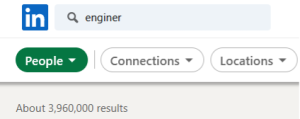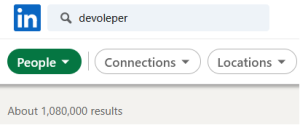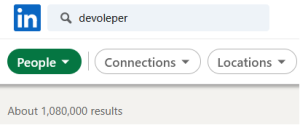In yesteryear’s avatar, in addition to sourcing and recruitment, I used to write proposals or edit proposals. The first thing I would do is fire up the “Find and Replace” option and look for words that can be misspelled like Manager, Public, etc. and the mistakes can be embarrassing if they make it to the final output. The spell check in MS-Word does not catch these errors.
You wonder why would this be relevant to a sourcer? A misspelled word, intentional or otherwise, can be your golden ticket to finding folks that other recruiters may end up glossing over.

Let’s get to the psychology behind these errors. It could either be a candidate may not have had a very good English background or they did not check the final output before releasing it to the public or they may be the ones who wish to outwit the recruiters by deliberate mis-spelling of the words so that their profiles do not show up in the search results and thereby avoid overload of message requests.
If you were to notice, such individuals usually would not list any skills or not the relevant skills in the Skills and Recommendation section in Linkedin.
Let’s look at a few such words as examples:
Example 1
Notice the word “Chief” misspelled as “Cheif”

Example 2
Notice the word “Engineer” misspelled as “Enginer”. Other variations could be “Enginner” OR “Engneer”

Example 3
Notice the word “Developer” misspelled as “Devloper” OR “Devoleper”


Example 4
Military is misspelled as “militry”. Other variations can be “Miltry” OR “Millitary”
As it is, the TA folks are inundated with hiring mandates and now you are telling me that I have to look for misspelled words too? Life is not fair. Wait. There is more to come.
Winning Options

The Americanized words are shortened compared to British standard English words (commonly used across the World) and here are some examples that can point you to source US-born or individuals that have some sort of deep American connection, living in a foreign jurisdiction, based on the words used in describing their experience.
“Or” verses “Our”
| US Specific | Non-US Specific |
| Behavior | Behaviour |
| Color | Colour |
| Endeavor | Endeavour |
| Favor | Favour |
| Flavor | Flavour |
| Honor | Honour |
| Labor | Labour |
| Rigor | Rigour |
| Rumor | Rumour |
“er” versus “re”
| US Specific | Non-US Specific |
| Caliber | Calibre |
| Center | Centre |
| Fiber | Fibre |
| Meager | Meagre |
| Meter | Metre |
“ense” versus “ence”
| US Specific | Non-US Specific |
| Defense | Defence |
| License | Licence |
| Offense | Offence |
“ize” versus “ise”
| US Specific | Non-US Specific |
| Analyze | Analyse |
| Organize | Organise |
| Realize | Realise |
| Recognize | Recognise |
Other words
| US Specific | Non-US Specific |
| Artifact | Artefact |
| Check | Cheque |
| Gray | Grey |
European Flavour
In European countries, spoken languages have a native name for some common English words or roles. You can utilize them on Linkedin or other sourcing channels to uncover additional prospects. A couple of country examples are described below:
| English | Romanian equivalent |
| Developer | dezvoltator |
| Programmer | Programator |
| Engineer | Inginer |
| Coder | Codificator |
| Product | Produs |
| Female or Woman | Femeie |
| English | Spanish equivalent |
| Developer | Desarrolladora (Feminine) OR Desarrollador (Masculine) |
| Programmer | Programadora (Feminine) OR Programador (Masculine) |
| Engineer | Ingeniera (Feminine) OR Ingeniero (Masculine) |
This guide has hopefully educated you on some secrets of uncovering prospects hiding plainly in sight. Based on your experience, what other words have proven to be useful in uncovering more prospects?
